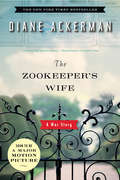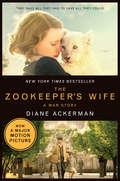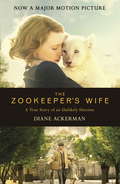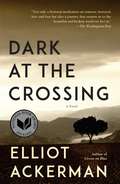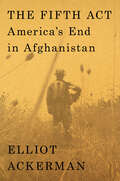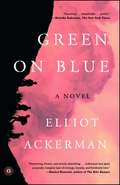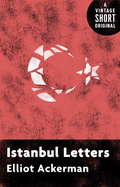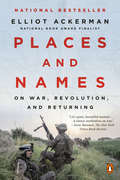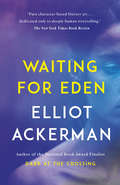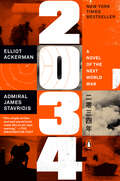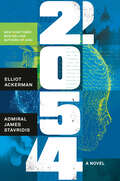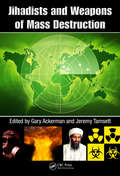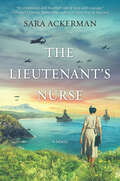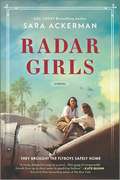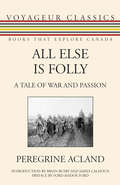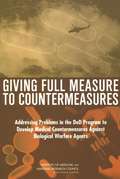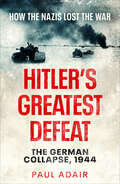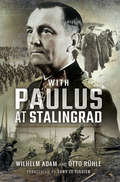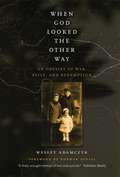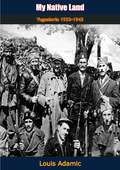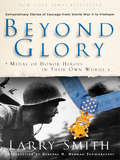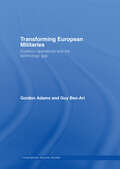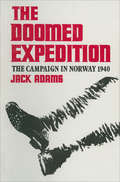- Table View
- List View
The Zookeeper's Wife: A War Story (Thorndike Biography Ser. #0)
by Diane Ackerman<P>The New York Times bestseller: a true story in which the keepers of the Warsaw Zoo saved hundreds of people from Nazi hands. After their zoo was bombed, Polish zookeepers Jan and Antonina Zabinski managed to save over three hundred people from the Nazis by hiding refugees in the empty animal cages. With animal names for these "guests," and human names for the animals, it's no wonder that the zoo's code name became "The House Under a Crazy Star." <P>Best-selling naturalist and acclaimed storyteller Diane Ackerman combines extensive research and an exuberant writing style to re-create this fascinating, true-life story--sharing Antonina's life as "the zookeeper's wife," while examining the disturbing obsessions at the core of Nazism. <P><b>Winner of the 2008 Orion Award.</b> <P><b>A New York Times Bestseller</b>
The Zookeeper's Wife: A War Story (Movie Tie-in Editions #0)
by Diane Ackerman<P>The movie The Zookeeper’s Wife, based on the New York Times bestselling book, opens March 2017. <P>1939: the Germans have invaded Poland. The keepers of the Warsaw zoo, Jan and Antonina Zabinski, survive the bombardment of the city, only to see the occupiers ruthlessly kill many of their animals. The Nazis then carry off the prized specimens to Berlin for their program to create the “purest” breeds, much as they saw themselves as the purest human race. Opposed to all the Nazis represented, the Zabinskis risked their lives by hiding Jews in the now-empty animal cages, saving as many as three hundred people from extermination. <P>Acclaimed, best-selling author Diane Ackerman, fascinated both by the Zabinskis’ courage and by Antonina’s incredible sensitivity to all living beings, tells a moving and dramatic story of the power of empathy and the strength of love. <P>A Focus Features release, it is directed by Niki Caro, written by Angela Workman.
The Zookeeper's Wife: An unforgettable true story, now a major film (Movie Tie-in Editions Ser. #0)
by Diane AckermanIn war-torn Warsaw, a zookeeper and his wife refuse to surrender... Now a major motion picture starring Jessica Chastain and Daniel Brühl, Diane Ackerman's The Zookeeper's Wife is based on a remarkable true story of bravery and sanctuary during World War II. Perfect for fans of Lion and Hidden Figures. 'I can't imagine a better story or storyteller. The Zookeeper's Wife will touch every nerve you have' -Jonathan Safran Foer, author of Everything is Illuminated When Germany invades Poland, Luftwaffe bombers devastate Warsaw and the city's zoo along with it. With most of their animals killed, or stolen away to Berlin, zookeepers Jan and Antonina Zabinski begin smuggling Jews into the empty cages.As the war escalates Jan becomes increasingly involved in the anti-Nazi resistance. Ammunition is buried in the elephant enclosure and explosives stored in the animal hospital. Plans are prepared for what will become the Warsaw uprising. Through the ever-present fear of discovery, Antonina must keep her unusual household afloat, caring for both its human and animal inhabitants - otters, a badger, hyena pups, lynxes - as Europe crumbles around them.Written with the narrative drive and emotional punch of a novel, The Zookeeper's Wife is a remarkable true story. It shows us the human and personal impact of war - of life in the Warsaw Ghetto, of fighting in the anti-Nazi resistance. But more than anything it is a story of decency and sacrifice triumphing over terror and oppression. What readers are saying about The Zookeeper's Wife: 'Beautifully and sensitively written - a must read''An adventure that inspires''Both horrifying and endearing on a scale I've not experienced in years''A story that will haunt you forever''Haunting, life affirming, sad, and inspiring'
Dark at the Crossing: A novel
by Elliot AckermanFrom the author of the acclaimed Green on Blue, a timely new novel of stunning humanity and tension: a contemporary love story set on the Turkish border with Syria. Haris Abadi is a man in search of a cause. An Arab American with a conflicted past, he is now in Turkey, attempting to cross into Syria and join the fight against Bashar al-Assad's regime. But he is robbed before he can make it, and is taken in by Amir, a charismatic Syrian refugee and former revolutionary, and Amir's wife, Daphne, a sophisticated beauty haunted by grief. As it becomes clear that Daphne is also desperate to return to Syria, Haris's choices become ever more wrenching: Whose side is he really on? Is he a true radical or simply an idealist? And will he be able to bring meaning to a life of increasing frustration and helplessness? Told with compassion and a deft hand, Dark at the Crossing is an exploration of loss, of second chances, and of why we choose to believe--a trenchantly observed novel of raw urgency and power.
The Fifth Act: America's End in Afghanistan
by Elliot AckermanA powerful and revelatory eyewitness account of the American collapse in Afghanistan, its desperate endgame, and the war&’s echoing legacyElliot Ackerman left the American military ten years ago, but his time in Afghanistan and Iraq with the Marines and later as a CIA paramilitary officer marked him indelibly. When the Taliban began to close in on Kabul in August 2021 and the Afghan regime began its death spiral, he found himself pulled back into the conflict. Afghan nationals who had worked closely with the American military and intelligence communities for years now faced brutal reprisal and sought frantically to flee the country with their families. The official US government evacuation effort was a bureaucratic failure that led to a humanitarian catastrophe. With former colleagues and friends protecting the airport in Kabul, Ackerman joined an impromptu effort by a group of journalists and other veterans to arrange flights and negotiate with both Taliban and American forces to secure the safe evacuation of hundreds. These were desperate measures taken during a desperate end to America's longest war. For Ackerman, it also became a chance to reconcile his past with his present. The Fifth Act is an astonishing human document that brings the weight of twenty years of war to bear on a single week, the week the war ended. Using the dramatic rescue efforts in Kabul as his lattice, Ackerman weaves a personal history of the war's long progression, beginning with the initial invasion in the months after 9/11. It is a play in five acts, the fifth act being the story&’s tragic denouement, a prelude to Afghanistan's dark future. Any reader who wants to understand what went wrong with the war&’s trajectory will find a trenchant account here. But The Fifth Act also brings readers into close contact with a remarkable group of characters, American and Afghan, who fought the war with courage and dedication, and at great personal cost. Ackerman's story is a first draft of history that feels like a timeless classic.
Green on Blue: A Novel
by Elliot AckermanFrom a decorated veteran of the Iraq and Afghan Wars, and White House Fellow, a stirring debut novel about a young Afghan orphan and the harrowing, intractable nature of war.Aziz and his older brother Ali are coming of age in a village amid the pine forests and endless mountains of eastern Afghanistan. There is no school, but their mother teaches them to read and write, and once a month sends the boys on a two-day journey to the bazaar. They are poor, but inside their mud-walled home, the family has stability, love, and routine. When a convoy of armed men arrives in their village one day, their world crumbles. The boys survive and make their way to a small city, where they sleep among other orphans. They learn to beg, and, eventually, they earn work and trust from the local shopkeepers. Ali saves their money and sends Aziz to school at the madrassa, but when US forces invade the country, militants strike back. A bomb explodes in the market, and Ali is brutally injured. In the hospital, Aziz meets an Afghan wearing an American uniform. To save his brother, Aziz must join the Special Lashkar, a US-funded militia. No longer a boy, but not yet a man, he departs for the untamed border. Trapped in a conflict both savage and entirely contrived, Aziz struggles to understand his place. Will he embrace the brutality of war or leave it behind, and risk placing his brother--and a young woman he comes to love--in jeopardy? Having served five tours of duty in Afghanistan and Iraq, Elliot Ackerman has written a gripping, morally complex debut novel, an astonishing feat of empathy and imagination about boys caught in a deadly conflict.
Istanbul Letters
by Elliot AckermanA Vintage Shorts Original Selection "Why do some forms of violence--the beheading of journalists by the Islamic State, a bombing in Ankara, or the attacks in San Bernardino and Orlando--make us feel so threatened, while other forms--the 372 separate mass shootings in America in 2015 or the 4,219 Syrians killed that same September--do little to challenge our sense of safety?" From his base in Istanbul, Elliot Ackerman has written letters and essays that explore how global and seemingly remote issues like terrorism, US foreign policy, and other geopolitical forces play out and wreak distress upon the quotidian lives of civilians. Here assembled into a haunting piece, the fragments of a year's notes open a window into life under President Recep Tayyip Erdoğan's oppressive and nationalistic right-wing regime, the civil war in Syria, and the disintegration of the old order in the Middle-East. Exposing how a pervasive rhetoric of fear can shape a society and written with intimacy and a tremendous amount of compassion, this is an astute political commentary and first-person travel narrative par excellence. An ebook short.
Places and Names: On War, Revolution, and Returning
by Elliot AckermanFrom a decorated Marine war veteran and National Book Award Finalist, an astonishing reckoning with the nature of combat and the human cost of the wars in Iraq, Afghanistan and Syria. <P><P>"War hath determined us ..." - John Milton, Paradise Lost <P><P>Toward the beginning of Places and Names, Elliot Ackerman sits in a refugee camp in southern Turkey, across the table from a man named Abu Hassar, who fought for Al Qaeda in Iraq, and whose connections to the Islamic State are murky. At first, Ackerman pretends to have been a journalist during the Iraq War, but after establishes a rapport with Abu Hassar, he takes a risk by revealing to him that in fact he was a Marine special operation officer. <P><P>Ackerman then draws the shape of the Euphrates River on a large piece of paper, and his one-time adversary quickly joins him in the game of filling in the map with the names and dates of where they saw fighting during the war. They had shadowed each other for some time, it turned out, a realization that brought them to a strange kind of intimacy. <P><P>The rest of Elliot Ackerman's extraordinary memoir is in a way an answer to the question of why he came to that refugee camp and what he hoped to find there. By moving back and forth between his recent experiences on the ground as a journalist in Syria and its environs and his deeper past in combat in Iraq and Afghanistan, he creates a work of astonishing atmospheric pressurization. <P><P>Ackerman shares extraordinarily vivid and powerful stories of his own experiences in battle, culminating in the events of the Second Battle of Fallujah, the most intense urban combat for the Marines since Hue in Vietnam, where Ackerman's actions leading a rifle platoon saw him awarded the Silver Star. He weaves these stories into the latticework of a masterful larger reckoning, with contemporary geopolitics through his vantage as a journalist in Istanbul and with the human extremes of both bravery and horror. <P><P> At once an intensely personal book about the terrible lure of combat and a brilliant meditation on the larger meaning of the past two decades of strife for America, the region and the world, Places and Names bids fair to take its place among our greatest books about modern war.
Waiting for Eden: A novel
by Elliot AckermanFrom the National Book Award finalist, a breathtakingly spare and shattering new novel that traces the intersection of three star-crossed lives.Eden Malcom lies in a bed, unable to move or to speak, imprisoned in his own mind. His wife Mary spends every day on the sofa in his hospital room. He has never even met their young daughter. And he will never again see the friend and fellow soldier who didn't make it back home--and who narrates the novel. But on Christmas, the one day Mary is not at his bedside, Eden's re-ordered consciousness comes flickering alive. As he begins to find a way to communicate, some troubling truths about his marriage--and about his life before he went to war--come to the surface. Is Eden the same man he once was: a husband, a friend, a father-to-be? What makes a life worth living? A piercingly insightful, deeply felt meditation on loyalty and betrayal, love and fear, Waiting for Eden is a tour de force of profound humanity.
2034: A Novel of the Next World War
by Elliot Ackerman Admiral James StavridisFrom two former military officers and award-winning authors, a chillingly authentic geopolitical thriller that imagines a naval clash between the US and China in the South China Sea in 2034--and the path from there to a nightmarish global conflagration. <P><P>On March 12, 2034, US Navy Commodore Sarah Hunt is on the bridge of her flagship, the guided missile destroyer USS John Paul Jones, conducting a routine freedom of navigation patrol in the South China Sea when her ship detects an unflagged trawler in clear distress, smoke billowing from its bridge. On that same day, US Marine aviator Major Chris "Wedge" Mitchell is flying an F35E Lightning over the Strait of Hormuz, testing a new stealth technology as he flirts with Iranian airspace. By the end of that day, Wedge will be an Iranian prisoner, and Sarah Hunt's destroyer will lie at the bottom of the sea, sunk by the Chinese Navy. Iran and China have clearly coordinated their moves, which involve the use of powerful new forms of cyber weaponry that render US ships and planes defenseless. In a single day, America's faith in its military's strategic pre-eminence is in tatters. A new, terrifying era is at hand. <P><P>So begins a disturbingly plausible work of speculative fiction, co-authored by an award-winning novelist and decorated Marine veteran and the former commander of NATO, a legendary admiral who has spent much of his career strategically outmaneuvering America's most tenacious adversaries. Written with a powerful blend of geopolitical sophistication and human empathy, 2034 takes us inside the minds of a global cast of characters--Americans, Chinese, Iranians, Russians, Indians--as a series of arrogant miscalculations on all sides leads the world into an intensifying international storm. In the end, China and the United States will have paid a staggering cost, one that forever alters the global balance of power. Everything in 2034 is an imaginative extrapolation from present-day facts on the ground combined with the authors' years working at the highest and most classified levels of national security. Sometimes it takes a brilliant work of fiction to illuminate the most dire of warnings: 2034 is all too close at hand, and this cautionary tale presents the reader a dark yet possible future that we must do all we can to avoid. <P><P><b>A New York Times Bestseller</b>
2054: A Novel
by Elliot Ackerman Admiral James StavridisFrom the acclaimed authors of the runaway New York Times bestseller 2034 comes another explosive work of speculative fiction set twenty years further in the future, at a moment when a radical leap forward in artificial intelligence combines with America&’s violent partisan divide to create an existential threat to the country, and the worldIt is twenty years after the catastrophic war between the United States and China that brought down the old American political order. A new party has emerged in the US, one that&’s held power for over a decade. Efforts to cement its grip have resulted in mounting violent resistance. The American president has control of the media, but he is beginning to lose control of the streets. Many fear he&’ll stop at nothing to remain in the White House. Suddenly, he collapses in the middle of an address to the nation. After an initial flurry of misinformation, the administration reluctantly announces his death. A cover-up ensues, conspiracy theories abound, and the country descends into a new type of civil war.A handful of elite actors from the worlds of computer science, intelligence, and business have a fairly good idea what happened. All signs point to a profound breakthrough in AI, of which the remote assassination of an American president is hardly the most game-changing ramification. The trail leads to an outpost in the Amazon rainforest, the last known whereabouts of the tech visionary who predicted this breakthrough. As some of the world&’s great powers, old and new, state and nonstate alike, struggle to outmaneuver one another in this new Great Game of scientific discovery, the outcome becomes entangled with the fate of American democracy.Combining a deep understanding of AI, biotech, and the possibility of a coming Singularity, along with their signature geopolitical sophistication, Elliot Ackerman and Admiral James Stavridis have once again written a visionary work. 2054 is a novel that reads like a thriller even as it demands that we consider the trajectory of our society and its potentially calamitous destination.
Jihadists and Weapons of Mass Destruction
by Gary Ackerman Jeremy TamsettExplores the Nexus Formed When Malevolent Actors Access Malignant MeansWritten for professionals, academics, and policymakers working at the forefront of counterterrorism efforts, Jihadists and Weapons of Mass Destruction is an authoritative and comprehensive work addressing the threat of weapons of mass destruction (WMD) in the hands of jihadists,
The Codebreaker's Secret: A WWII Novel
by Sara AckermanA brilliant female codebreaker. An &“unbreakable&” Japanese naval code. A pilot on a top-secret mission that could change the course of WWII. The Codebreaker's Secret is a dazzling story of love and intrigue set during America&’s darkest hour.1943. As war in the Pacific rages on, Isabel Cooper and her codebreaker colleagues huddle in &“the dungeon&” at Station HYPO in Pearl Harbor, deciphering secrets plucked from the airwaves in a race to bring down the enemy. Isabel has only one wish: to avenge her brother&’s death. But she soon finds life has other plans when she meets his best friend, a hotshot pilot with secrets of his own.1965. Fledgling journalist Lu Freitas comes home to Hawai'i to cover the grand opening of the glamorous Mauna Kea Beach Hotel, Rockefeller's newest and grandest project. When a high-profile guest goes missing, Lu forms an unlikely alliance with an intimidating veteran photographer to unravel the mystery. The two make a shocking discovery that stirs up memories and uncovers an explosive secret from the war days. A secret that only a codebreaker can crack."Sara Ackerman never disappoints!" —Kate Quinn, New York Times bestselling author of The Rose Code"Brilliantly written with a mystery that will keep you reading late into the night. . . . A fabulous read that makes me want to drop everything and travel to Hawaii!" —Madeline Martin, New York Times bestselling author of The Last Bookshop in London"Beautifully structured and well-told with authentic historical detail . . . another top historical novel by Ackerman." —Booklist (starred) "Thoughtful, romantic and ultimately hopeful, The Codebreaker's Secret is a riveting story of intrigue and love in wartime"—Shelf Awareness
The Lieutenant's Nurse: A Novel
by Sara Ackerman“An emotional and heartfelt tale of love and courage.” —Chanel Cleeton, bestselling author of the Reese Witherspoon Book Club pick Next Year in HavanaNovember, 1941. She’s never even seen the ocean before, but Eva Cassidy has her reasons for making the crossing to Hawaii, and they run a lot deeper than escaping a harsh Michigan winter. Newly enlisted as an Army Corps nurse, Eva is stunned by the splendor she experiences aboard the steamship SS Lurline; even more so by Lt. Clark Spencer, a man she is drawn to but who clearly has secrets of his own. But Eva’s past—and the future she’s trying to create—means that she’s not free to follow her heart. Clark is a navy intelligence officer, and he warns her that the United States won’t be able to hold off joining the war for long, but nothing can prepare them for the surprise attack that will change the world they know.In the wake of the bombing of Pearl Harbor, Eva and her fellow nurses band together for the immense duty of keeping the American wounded alive. And the danger that finds Eva threatens everything she holds dear. Amid the chaos and heartbreak, Eva will have to decide whom to trust and how far she will go to protect those she loves.Set in the vibrant tropical surroundings of the Pacific, The Lieutenant’s Nurse is an evocative, emotional WWII story of love, friendship and the resilient spirit of the heroic nurses of Pearl Harbor.
Radar Girls: a novel of WWII
by Sara Ackerman"A fresh, delightful romp of a novel."—Kate Quinn, New York Times bestselling author of The Rose Code* SheReads Most Anticipated Historical Fiction of Summer 2021 pick * Book Reporter Summer Reading pick * BiblioLifestyle Most Anticipated Summer 2021 Historical Fiction Books selection * Greatist Best Historical Fiction Books pick * An extraordinary story inspired by the real Women&’s Air Raid Defense, where an unlikely recruit and her sisters-in-arms forge their place in WWII history.Daisy Wilder prefers the company of horses to people, bare feet and salt water to high heels and society parties. Then, in the dizzying aftermath of the attack on Pearl Harbor, Daisy enlists in a top secret program, replacing male soldiers in a war zone for the first time. Under fear of imminent invasion, the WARDs guide pilots into blacked-out airstrips and track unidentified planes across Pacific skies. But not everyone thinks the women are up to the job, and the new recruits must rise above their differences and work side by side despite the resistance and heartache they meet along the way. With America&’s future on the line, Daisy is determined to prove herself worthy. And with the man she&’s falling for out on the front lines, she cannot fail.From radar towers on remote mountaintops to flooded bomb shelters, she&’ll need her new team when the stakes are highest. Because the most important battles are fought—and won—together.This inspiring and uplifting tale of pioneering, unsung heroines vividly transports the reader to wartime Hawaii, where one woman&’s call to duty leads her to find courage, strength and sisterhood. &“A wow of a book…[that is] a captivating story of friendship, heartbreak and true love. Highly recommend!&” —Karen Robards, New York Times bestselling author of The Black Swan of Paris
Red Sky Over Hawaii: A Novel
by Sara AckermanInspired by real places and events of WWII, Red Sky Over Hawaii immerses the reader in a time of American history full of suspicion and peril in this lush and poignant tale about the indisputable power of doing the right thing against all odds.The attack on Pearl Harbor changes everything for Lana Hitchcock. Arriving home on the Big Island too late to reconcile with her estranged father, she is left alone to untangle the clues of his legacy, which lead to a secret property tucked away in the remote rain forest of Kilauea volcano. When the government starts taking away her neighbors as suspected sympathizers, Lana shelters two young German girls, a Japanese fisherman and his son. As tensions escalate, they are forced into hiding—only to discover the hideaway house is not what they expected.When a detainment camp is established nearby, Lana struggles to keep the secrets of those in her care. Trust could have dangerous consequences. As their lives weave together, Lana begins to understand the true meaning of family and how the bonds of love carry us through the worst times.
All Else Is Folly: A Tale of War and Passion
by Peregrine Acland Brian Busby James R. Calhoun Ford Madox FordOne of Canada’s most painful and breathtaking pictures of a soldier’s life during the First World War. Peregrine Acland’s novel All Else Is Folly is an irreplaceable depiction of the Canadian experience in the First World War. More than just a devastating portrayal of the terrors and hardships of trench warfare, the novel is also a profound meditation on the nature of man, one that draws on both the Nietzschean notion of man as warrior and Havelock Ellis’s idea of man as lover. Subtitled "a tale of war and passion," the novel was something of a bestseller in its time and drew significant critical praise. Canadian Prime Minister Sir Robert Borden remarked: "No more vivid picture has been painted of what war meant to the average soldier." Originally published in 1929, Acland’s war story had transatlantic success, with editions published under the Constable imprint in England, and by Coward-McCann and Grosset & Dunlap in the United States. The Canadian edition published by McClelland & Stewart enjoyed three printings. This new edition marks a return to print after more than eight decades.
Giving Full Measure to Countermeasures: Addressing Problems in the DoD Program to Develop Medical Countermeasures Against Biological Warfare Agents
by Acquisition of Medical Countermeasures Against Biological Warfare AgentsIn recent years, substantial efforts have been initiated to develop new drugs, vaccines, and other medical interventions against biological agents that could be used in bioterrorist attacks against civilian populations. According to a new congressionally mandated report from the Institute of Medicine and National Research Council of the National Academies, to successfully develop these drugs, vaccines, and other medical interventions against biowarfare agents, Congress should authorize the creation of a new agency within the Office of the Secretary of the U.S. Department of Defense. The committee recommended that Congress should improve liability protections for those who develop and manufacture these products, to stimulate willingness to invest in new research and development for biowarfare protection. Giving Full Measure to Countermeasures also identifies other challenges—such as the need for appropriate animal models and laboratories equipped with high-level biosafety protections—that will require attention if DoD efforts to develop new medical countermeasures are to be successful.
Hitler's Greatest Defeat: The German Collapse, 1944
by Paul AdairHow the Nazis lost the war1944 was a year of trial for the German Army. While the Allies were preparing to invade the Third Reich from the west, Stalin was set on a massive offensive to liberate the last remaining areas of Soviet territory still held by the Germans. Hitler was determined to hold fast. His muddled strategic thinking nullified the undoubted operational ability of his generals, and disaster was the inevitable result.This book is a gripping analysis of the Soviet campaign to capture Byelorussia, the German attempts to counter it, and the final, terrible collapse of Army Group Centre, inflicting even greater losses on the Germans than their earlier defeat at Stalingrad. It was a catastrophe of unbelievable proportions: 28 of 34 divisions, over 300,000 men, were lost. Hitler’s war effort was doomed and broken.An unputdownable history perfect for readers of Antony Beevor or James Holland.
With Paulus at Stalingrad
by Wilhelm Adam Otto RühleThis memoir from an aide to, and fellow POW of, General Friedrich Paulus documents a unique perspective on the horror of Stalingrad. Colonel Wilhelm Adam, senior ADC to General Paulus, commander of the German 6th Army at Stalingrad, wrote this compelling and controversial memoir describing the German defeat, his time as a prisoner of war with Paulus, and his conversion to communism. Now, for the first time, his German text has been translated into English. His account gives an intimate insight into events at the 6th Army headquarters during the advance to Stalingrad and the protracted and devastating battle for possession of the city. In vivid detail, he recalls the sharp personality clashes among the senior commanders and their intense disputes about tactics and strategy, but he also records the ordeal of the German troops trapped in the encirclement and his own role in the fighting. The extraordinary story he tells, fluently translated by Tony Le Tissier, offers a genuinely fresh perspective on the battle, and it reveals much about the prevailing attitudes and tense personal relationships of the commanders at Stalingrad and at Hitler&’s headquarters. &“Through his daily involvement with them, Wilhelm Adam is able to perfectly describe the characters involved, the tensions and despair amongst them and the pressure Paulus and his staff found themselves under as the Soviet pincers closed around the men of the abandoned 6th Army. The reader is presented with the hopeless situation faced by Paulus and his staff who, aware of the looming disaster from a very early stage are constantly denied the option of a withdrawal by Hitler and left to their catastrophic fate.&”—Grossdeutschland Aufklarungsgruppe
When God Looked the Other Way: An Odyssey of War, Exile, and Redemption
by Wesley AdamczykOften overlooked in accounts of World War II is the Soviet Union's quiet yet brutal campaign against Polish citizens, a campaign that included, we now know, war crimes for which the Soviet and Russian governments only recently admitted culpability. Standing in the shadow of the Holocaust, this episode of European history is often overlooked. Wesley Adamczyk's gripping memoir, When God Looked the Other Way, now gives voice to the hundreds of thousands of victims of Soviet barbarism. Adamczyk was a young Polish boy when he was deported with his mother and siblings from their comfortable home in Luck to Soviet Siberia in May of 1940. His father, a Polish Army officer, was taken prisoner by the Red Army and eventually became one of the victims of the Katyn massacre, in which tens of thousands of Polish officers were slain at the hands of the Soviet secret police. The family's separation and deportation in 1940 marked the beginning of a ten-year odyssey in which the family endured fierce living conditions, meager food rations, chronic displacement, and rampant disease, first in the Soviet Union and then in Iran, where Adamczyk's mother succumbed to exhaustion after mounting a harrowing escape from the Soviets. Wandering from country to country and living in refugee camps and the homes of strangers, Adamczyk struggled to survive and maintain his dignity amid the horrors of war. When God Looked the Other Way is a memoir of a boyhood lived in unspeakable circumstances, a book that not only illuminates one of the darkest periods of European history but also traces the loss of innocence and the fight against despair that took root in one young boy. It is also a book that offers a stark picture of the unforgiving nature of Communism and its champions. Unflinching and poignant, When God Looked the Other Way will stand as a testament to the trials of a family during wartime and an intimate chronicle of episodes yet to receive their historical due. "Adamczyk recounts the story of his own wartime childhood with exemplary precision and immense emotional sensitivity, presenting the ordeal of one family with the clarity and insight of a skilled novelist. . . . I have read many descriptions of the Siberian odyssey and of other forgotten wartime episodes. But none of them is more informative, more moving, or more beautifully written than When God Looked the Other Way."--From the Foreword by Norman Davies, author of Europe: A History and Rising '44: The Battle for Warsaw "A finely wrought memoir of loss and survival."--Publishers Weekly "Adamczyk's unpretentious prose is well-suited to capture that truly awful reality." --Andrew Wachtel, Chicago Tribune Books "Mr. Adamczyk writes heartfelt, straightforward prose. . . . This book sheds light on more than one forgotten episode of history."--Gordon Haber, New York Sun "One of the most remarkable World War II sagas I have ever read. It is history with a human face."--Andrew Beichman, Washington Times
My Native Land: Yugoslavia 1933-1943
by Louis AdamicBASED UPON THE AUTHOR’S EXCLUSIVE MATERIAL, THIS INCREDIBLE STORY OF YUGOSLAVIA—THE COUNTRY OF THE CROATIANS, SERBIANS AND THE SLOVENIANS—AND HER HEROIC STRUGGLE HOLDS A SIGNIFICANT LESSON FOR THE DEMOCRACIESIn a sequel to The Native’s Return and Two-Way Passage, Louis Adamic, writing with deeply felt conviction, tells the tragic story of Yugoslavia under Axis domination and of a struggle for power that will vitally affect the future of Europe and America.Drawing on his intimate knowledge of Yugoslavia and its people and on personal eyewitness reports which have been reaching him through secret channels, he paints the grim picture of life and death under Axis occupation and shows what it actually means in terms of people’s lives. These personal stories and portraits are unforgettable. They go behind the headlines to the experience that is the lot of people not in Yugoslavia but all of occupied Europe, to the unbelievable heroism that lifts the heart and steels it for the time ahead.He tells also the story of Yugoslav resistance, of two years of intensifying guerrilla warfare, of a struggle that has been confused, bitter, tragic.
Beyond Glory: Medal of Honor Heroes in Their Own Words
by Eddie Adams Larry Smith H. Norman SchwarzkopfThis first oral history of living Medal of Honor winners evokes Flags of Our Fathers with stirring accounts of patriotic valor. This New York Times best-selling account of battlefield courage celebrates the larger-than-life sacrifices of those awarded the nation's highest honor for valor in combat. Exclusive interviews with these twenty-four men--firsthand accounts of battlefield sacrifice from the greatest generation to Vietnam, along with before-and-after stories--form the core of this classic work. The recipients, as portrayed here, represent a cross-section as diverse as America itself--officers and enlisted men; African Americans, Hispanics, and Caucasians; men who went on to become famous (Daniel Inouye, James Stockdale, Bob Kerrey) and others who returned proudly to small towns. Beyond Glory, in the voices of these heroes, is a testament to the courage of the American nation.
Transforming European Militaries: Coalition Operations and the Technology Gap (Contemporary Security Studies)
by Gordon Adams Guy Ben-AriA unique look at European Network Enabled Capabilities (NEC) and their implications for transatlantic co-operation in future operations. Gordon Adams and Guy Ben-Ari identify the key requirements for improvement of Europe’s abilities as an international actor. They focus on national and collaborative, as well as existing and planned, networks. They clearly show the reader how, with the removal of the risks of Soviet invasion, European defence planners must now modify their strategies and capabilities to address new threats, both at home and overseas. They also show why future operations within international coalitions will require network-based capabilities that can interoperate. Europe possesses a technological and industrial base adequate to supply such capabilities, and its defence strategies are gradually being modified to emphasize expeditionary forces operations within coalition settings. However, much remains to be done. This volume tackles the key challenges facing European nations who need to operate alongside each other and with their North American allies more effectively and efficiently. This book will be of great interest to all students of European affairs and politics, international relations and military and strategic studies.
The Doomed Expedition: The Campaign in Norway, 1940
by Jack AdamsA gripping account of the disastrous first significant land encounter of WWII, focusing on the areas of Narvik and Bodö-Mosjöen, Namsos and Aandalsnes.In the early hours of 9 April 1940, the Germans invaded Denmark and Norway. Within twenty-four hours, Denmark was overwhelmed and the main Norwegian airfields and seaports were under German control. Thus started the first confrontation in modern war in which combined operations on land, sea, and in the air were fully involved.Reluctantly the Allies launched Anglo-French landings in the Lofoten Islands and in Central Norway. At the outset, serious liaison, command and, above all, communication problems arose.The urgent military needs of the Norwegians, with their King and government pursued by the Germans, were tragically misrepresented and never fully understood by the Allied politicians. On another level, personality clashes between senior commanders further confused conditions in the field, where lack of air cover, supporting arms, and equipment made the task of the comparatively few combatants almost impossible to perform. Heroic battles and humiliating retreats led to the inevitable evacuation of an Allied expedition doomed from the start.
